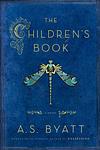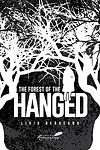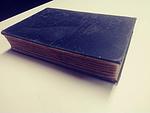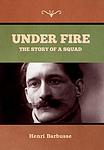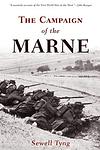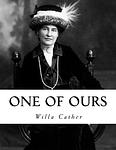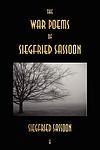The Greatest "World War I" Books of All Time
Click to learn how this list is calculated.
This list represents a comprehensive and trusted collection of the greatest books. Developed through a specialized algorithm, it brings together 300 'best of' book lists to form a definitive guide to the world's most acclaimed books. For those interested in how these books are chosen, additional details can be found on the rankings page.
Genres
Countries
Date Range
Reading Statistics
Click the button below to see how many of these books you've read!
Download
If you're interested in downloading this list as a CSV file for use in a spreadsheet application, you can easily do so by clicking the button below. Please note that to ensure a manageable file size and faster download, the CSV will include details for only the first 500 books.
Download-
26. The Enormous Room by E. E. Cummings
"The Enormous Room" is a semi-autobiographical novel about the author's time spent in a French prison during World War I. The protagonist is arrested and detained for his anti-war sentiments, and the story explores his experiences and observations within the prison. The novel is known for its unique and experimental use of language and its vivid, often surreal depictions of life in confinement.
-
27. The Ghost Road by Pat Barker
"The Ghost Road" is a historical novel set during World War I that follows the experiences of a British army officer undergoing treatment for shell shock at a mental hospital. The narrative alternates between his perspective and that of his psychiatrist, who is fascinated by the psychological effects of war. The novel explores themes of trauma, memory, and the brutal realities of war, while also delving into the psychiatrist's own past experiences with a headhunting tribe in the South Pacific.
-
28. The Children's Book by A. S. Byatt
"The Children's Book" is a historical novel that explores the lives of several families, primarily the Wellwoods, from the end of the Victorian era through World War I. The story delves into the complex relationships between parents and children, the influence of storytelling, and the impact of political and social changes on personal lives. It also portrays the struggles of women's suffrage, socialism, and the arts and crafts movement. The narrative is intricately woven with fairy tales and myths, reflecting the characters' inner lives and the era's cultural milieu.
-
29. Forest of the Hanged by Liviu Rebreanu
"Forest of the Hanged" is a gripping novel set during World War I, focusing on a Romanian officer serving in the Austro-Hungarian army who is forced to confront his own morality and identity. After his brother is executed for treason, the protagonist struggles with his loyalty to the army and his inherent connection to his native land, leading to a profound spiritual crisis. The narrative explores themes of nationalism, duty, conscience, and the devastating psychological impact of war.
-
30. The Case of Sergeant Grischa by Arnold Zweig
The book tells the story of Sergeant Grischa, a Russian POW who escapes from a German prison camp during World War I. After assuming the identity of a dead comrade to evade capture, he is eventually caught and sentenced to death for desertion. Despite several attempts by various individuals to save him, bureaucratic and military rigidity prevent his exoneration. The novel explores the themes of justice, humanity, and the absurdity of war.
-
31. Back by Henry Green
"Back" is a novel about a British man who returns home after being a prisoner of war during World War II. He struggles to adjust to civilian life and is haunted by the loss of his lover, who died while he was away. As he tries to move on, he becomes entangled in a complicated relationship with his lover's half-sister, leading to a poignant exploration of love, loss, and the human capacity for resilience.
-
32. Under Fire by Henri Barbusse
"Under Fire" is a gripping first-person narrative of life in the trenches during World War I. The protagonist, a French soldier, provides an intimate and harrowing account of the physical and psychological toll of warfare. The book presents a grim picture of the war, highlighting the camaraderie among soldiers, the horror of the battlefield, the senseless loss of life, and the disillusionment of those who must endure it. The narrative is known for its stark realism and profound anti-war sentiments.
-
33. Storm of Steel by Ernst Jünger
"Storm of Steel" is a memoir of a German officer's experiences during World War I. The book provides a detailed account of the daily life in the trenches, the brutal and chaotic nature of warfare, and the psychological impact on the soldiers. The author describes the horrors of war with a sense of detachment, viewing the battlefield as a place where one's character is tested and shaped. Despite the grim subject matter, the memoir is often noted for its poetic language and vivid imagery.
-
34. The Campaign of the Marne by Sewell Tyng
"The Campaign of the Marne" is a detailed account of the crucial battle that took place during the early stages of World War I. The book provides an in-depth analysis of the strategies, tactics, and decisions made by both the Allies and the German forces. It sheds light on the significant impact of the battle, which halted the German advance into France and marked a turning point in the war. The author also explores the larger political and social context of the war, offering a comprehensive understanding of this critical historical event.
-
35. Collected Poems by Nils Ferlin
"Collected Poems" is a compilation of the works of a renowned Swedish poet, capturing the essence of his unique style and lyrical prowess. The poems explore various themes such as love, life, death, and the human condition, often with a touch of melancholy and a keen sense of observation. The poet's ability to weave intricate emotions and vivid imagery into his verses makes this collection a testament to his literary genius.
-
36. The Wars by Timothy Findley
"The Wars" is a historical novel that follows the life of a young Canadian soldier, Robert Ross, during World War I. The narrative explores Ross's experiences in the war, his struggles with his own morality, and the harsh realities of the battlefield. The book also delves into the psychological impact of war on soldiers, as well as the effects of war on animals, which Ross is particularly sensitive to. Through non-linear storytelling, the novel provides a visceral and poignant commentary on the brutality and senselessness of war.
-
37. Mr Standfast by John Buchan
"Mr Standfast" is a thrilling espionage novel set during World War I. The protagonist is a British intelligence officer who is tasked with tracking down a German spy. The mission takes him on a dangerous journey across war-torn Europe, where he encounters a variety of characters and faces numerous challenges. Along the way, he uncovers a plot that could change the course of the war. The novel is a blend of suspense, action, and romance, with a strong emphasis on patriotism and duty.
-
38. Calligrammes by Guillaume Apollinaire
"Calligrammes" is a collection of free verse poetry and typographical experiments by a French poet. The poems are noted for their use of complex visual layouts and playful language, which often incorporate elements of surrealism and cubism. The collection is also notable for its exploration of various themes, including love, war, and the passage of time. The title of the collection refers to the poet's use of words and phrases to create a visual image, or calligram, on the page.
-
39. The Poems of Wilfred Owen by Wilfred Owen
This collection of poignant and powerful poetry provides an intimate look into the horrors of World War I, as seen through the eyes of a soldier. The poems, filled with raw emotion and vivid imagery, explore themes of war, death, and the human spirit. The author's personal experiences on the battlefield, coupled with his masterful use of language and form, create a profound commentary on the brutality of war and its impact on the individuals involved.
-
40. One of Ours by Willa Cather
The novel follows the life of Claude Wheeler, a young Nebraska native who is dissatisfied with his prosperous farming life. When the United States enters World War I, he sees it as an opportunity to find purpose and meaning, and enlists in the army. The book explores his experiences and struggles in the war, his longing for home, and his ultimate sacrifice, providing a poignant commentary on the impact of war on the individual and society.
-
41. War Poems of Siegfried Sassoon by Siegfried Sassoon
The book is a collection of poetry that vividly depicts the harsh realities of war. Written by a soldier who served during World War I, the poems capture the grim and brutal experiences of combat, providing a stark contrast to the romanticized notions of warfare. The author's vivid imagery and emotive language provide a powerful commentary on the futility and horror of war, making it a significant contribution to war literature.
-
42. A Fable by William Faulkner
This novel is a World War I allegory where a Christ-like figure emerges within a French regiment, sparking a mutiny. The figure, a corporal, persuades his squadron to not attack in the bloody conflict, leading to their court-martial and execution. The narrative explores themes of war, morality, and the human spirit, with the corporal's actions causing a ripple effect, impacting the lives of soldiers, officers, and even a Jesuit priest.
-
43. Memoirs of a Fox-Hunting Man by Siegfried Sassoon
This semi-autobiographical novel follows the life of a young man growing up in the English countryside in the early 20th century. He's enamored with the sport of fox hunting, and through his experiences and interactions with the rural community and the natural world, he develops a deep appreciation for the beauty and tranquility of life. However, the advent of World War I shatters his peaceful existence, forcing him to confront the harsh realities of life and the brutality of war.
-
44. The Burden of Southern History by C. Vann Woodward
This book explores the unique and complex history of the American South, examining its racial tensions, social inequalities, and political controversies. The author analyzes the impact of the Civil War and Reconstruction, the myths and realities of the Old South, the region's relationship with the rest of the United States, and the ways in which its history has shaped its contemporary identity. The book provides a comprehensive and nuanced understanding of the South's historical burden and its influence on the region's present and future.
-
45. My Life by Leon Trotsky
This autobiography provides a detailed account of the life of a prominent Russian revolutionary and Marxist theorist. The book traces his early life, education, and political development, his role in the Russian Revolution and Civil War, his leadership of the Red Army, and his expulsion from the Communist Party and subsequent exile. It offers a unique perspective on key events in 20th-century history and an insight into the author's complex personality and intellectual development.
-
46. Someone Like You by Roald Dahl
"Someone Like You" is a collection of dark and twisted short stories that explore the depths of human nature. From tales of revenge and deceit to stories of unexpected twists and turns, this book delves into the sinister side of humanity, leaving readers questioning their own morals and beliefs. With Dahl's signature wit and mastery of storytelling, each narrative is a captivating and unsettling journey into the complexities of the human psyche.
-
47. The Eye in the Door by Pat Barker
"The Eye in the Door" is a historical novel set during World War I. The story follows a British army officer suffering from shell shock, as well as his psychologist, as they navigate the traumas of war and the tumultuous political climate. The book explores themes of mental illness, homosexuality, and the societal pressures of the time, all against the backdrop of the war and its effects on those involved.
-
48. The Economic Consequences of the Peace by John Maynard Keynes
This book is a critique of the Treaty of Versailles, written by a British economist who was part of the British delegation to the peace conference. The author argues that the harsh reparations and economic measures imposed on Germany after World War I were unfair and would lead to economic instability and another war. He suggests that a more just and economically sound approach would have been to rebuild Germany and integrate it into the global economy, rather than punishing it.
-
49. The Blind Side of the Heart by Julia Franck
"The Blind Side of the Heart" is a historical novel that explores the life of a German woman before, during, and after World War II. The story begins with her abandonment of her young son at a railway station, then flashes back to her own childhood, her experiences during the war, and her tumultuous relationships. The narrative provides a deep and unflinching look at the psychological effects of war and the struggle for survival, as well as the profound impact of trauma and loss.
-
50. War by Margaret MacMillan
"War" by Margaret MacMillan is a comprehensive analysis of the causes, conduct, and consequences of war throughout history. Drawing on a vast range of sources, including personal accounts, political documents, and military strategy, MacMillan explores the human motivations behind war and the complex web of political, economic, and social factors that drive nations to conflict. She examines the impact of war on individuals and societies, from the trauma of soldiers on the front lines to the far-reaching political and economic consequences of global conflicts. Ultimately, MacMillan argues that war is a deeply human phenomenon, shaped by the complex interplay of individual and collective desires, fears, and ambitions.
Reading Statistics
Click the button below to see how many of these books you've read!
Download
If you're interested in downloading this list as a CSV file for use in a spreadsheet application, you can easily do so by clicking the button below. Please note that to ensure a manageable file size and faster download, the CSV will include details for only the first 500 books.
Download

